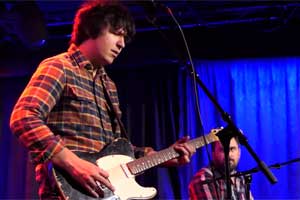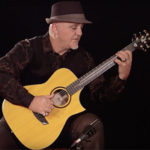The road to the Chicago-based player’s own Avalon
By Gary Graff
October 14, 2016
Davy Knowles was born on the Isle Of Man in Great Britain, but his real home — spiritually and, for the past eight years, physically — is Chicago. The guitarist, singer and songwriter is a disciple and devotee of the Windy City’s famed blues heritage, and all the music that evolved from it. Inspired to play guitar by Dire Straits’ “Sultans Of Swing,” Knowles led the group Back Door Slam from 2003-2009, then launched a solo career with Coming Up For Air — produced by Peter Frampton — that same year and went on to dazzle crowds at festivals and on tour with the likes of Jeff Beck and Buddy Guy.
The Outsider followed in 2014, and on Oct. 14 Knowles releases Three Miles From Avalon, recording with his band in Chicago and featuring the Rory Gallagher homage “What You’re Made Of.” Three Miles From Avalon will put Knowles and company on the road for the foreseeable future, allowing him to show audiences the skill that Frampton said was “some of the most tasteful, exciting playing I’ve heard in many years.”
FGPO: So how does a man from the Isle Of Man wind up in sweet home Chicago?
Knowles: I moved for my now fiance — a typical musician’s story. [laughs] We’d spent a lot of time here during Back Door Slam; it was a great kind of place to base ourselves while touring the dives and what have you. So I spent a lot of time here and loved the city and kind of moved here once I met Amber. There wasn’t too much persuasion involved. I’ve loved it ever since.
FGPO: You’ve made the pilgrimage to Chess studios?
Knowles: I went there once and we had the tour, and it was only right at the last minute did the lady say she was Willie Dixon’s daughter. We were like: “Oh, we wish you had told us that before…”
FGPO: How did guitar become “it” for you?
Knowles: I was 11 years old and my dad picked me up from a friend’s house. He had “Sultans Of Swing” on in the car, and from that moment on I just needed to know how to do that. That was the big turning point.
FGPO: So you were a prodigy?
Knowles: A little bit, I guess. It happened really quick, actually. My dad played a little bit, and he had an acoustic guitar that was far too big for me and had steel strings that hurt. But he showed me a few chords to begin with and then bought me a three-quarter size nylon string guitar, and I would sit and watch a VHS tape of Mark Knopfler, trying to make that same noise.
FGPO: Have you ever met Knopfler and told him that story?
Knowles: Omigod, no! [laughs] That’s someone I’d be utterly starstruck and terrified to meet. I’d make a fool out of myself.
FGPO: What is it about him that made him such a touchstone for you?
Knowles: Playing-wise, I like Mark Knopfler in the sense you can sing every note he plays. And you can hear him kind of like the tension of it, the build of it. He’s got a marvelous feel for those things. Instead of just the school of “Rawwwwr!” he’s got a marvelous feel and a great flow for building and structuring a solo in particular.
FGPO: Did you foresee yourself playing guitar for a living as a youth?
Knowles: I don’t think I had any real dreams of grandeur very early on, when you’re not really sure of how it all works. I probably did want to be a big, arena-selling kind of guitar thing, but I think as I got a little older, going through high school, it was just: “I want to be a musician who writes their own music, records their own music and makes a living at it.” That’s always been the early goal, really, is just to keep making a living out of doing it.
FGPO:What was working with Peter Frampton like on Coming Up For Air?
Knowles: Oh, it was great. What a marvelous human being he is, and just an amazing musician. Highly underrated, I think. We kind of stayed friends long after that album, and I’ve got a huge amount of love and respect for that man. He’s made it through the other side of superstardom and is just the most incredible person.
FGPO: So what did you set out to do with Three Miles From Avalon?
Knowles: Well, the previous record — which I’m really proud of — just took so long to make. After that one had kind of run its course and done its thing, I started looking towards doing the same thing. But then I thought: “Right, the best thing I could possibly do here is get the band, ’cause we’ve been playing together such a long time, and get in the studio.” I had this whole bunch of kind of blues and rock tunes I’d been kicking around for awhile, so I thought: “Let’s go bang this one out in a few days.” I wanted to go back and do this the old-fashioned way, just a well-rehearsed band and get in and play. And we did the whole thing in about three-and-a-half days — the whole thing to tape, too, which was great.
FGPO: Old school approach and old school sound, too, eh?
Knowles: That’s right. I was such a big record collector and vinyl nut and music nerd in general that I really wanted to make an album that would stand up to being recorded the old way, to tape with a live band rather than so many overdubs you can’t hear anything. I wanted to almost tailor it for vinyl in a way. That was certainly part of it.
FGPO: Did that impact on the kind of gear you used as well?
Knowles: Oh yeah, absolutely. I used one amplifier, the one I play live, a [Hughes & Kettner] Duotone. And I used, for the majority of everything, a Telecaster, and that was again that kind of idea of going back to basics, just super raw, no frills. I think I only used one pedal, an octave pedal on the song “Falling Apart,” and aside from that maybe a little bit of reverb and a little bit of delay on the record side of it. And that’s it. A lack of toys to mess with can sometimes be an incredibly inspiring place to live, just in that you don’t rely on something and you can’t blame it on something. You get a good guitar sound and you stick with it, and it’s up to you to make it work. That can be quite inspiring.
FGPO: “What You’re Made Of” is such a nice tribute to Rory Gallagher. What kind of connection or kinship do you feel to him?
Knowles: I’m such a huge Rory Gallagher fan. I grew up on the Isle Of Man, which is a Celtic nation, but I’d never really bothered with traditional music until much later in my life. I was big into John Mayall & the Bluesbreakers, some of the American blues guys like [Michael] Bloomfield. And then Rory, when he came along for me, it was the first time I’d heard this American, aggressive blues sound. But from where I was from I could hear his kind of Celtic inflections and his upbringing that he brought to the table. That was a bit of a revelation for me; I thought: “Wow, I didn’t think you could combine those things.” Where you’re from is such a huge part of what you do. That was a huge lesson to learn. I never got to see him, but from all the footage I’ve seen he was just a force of nature, that man. He has this great kind of work ethic instilled in his music, so I wanted to get that in there as part of mine as well.






